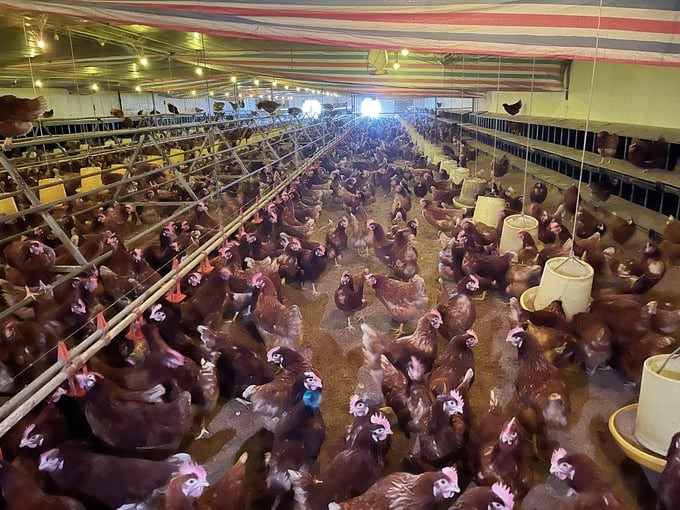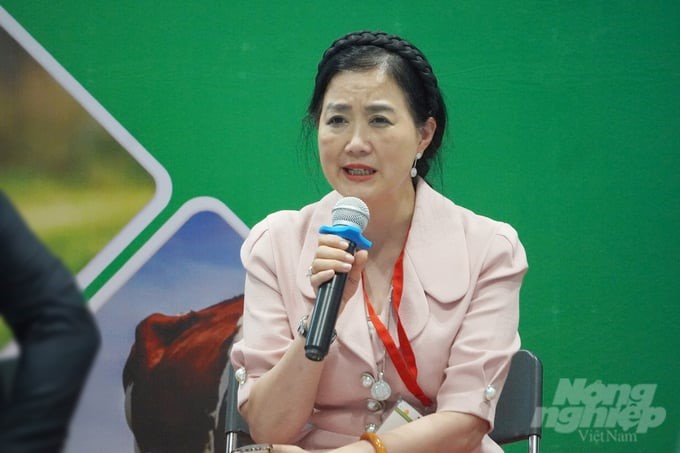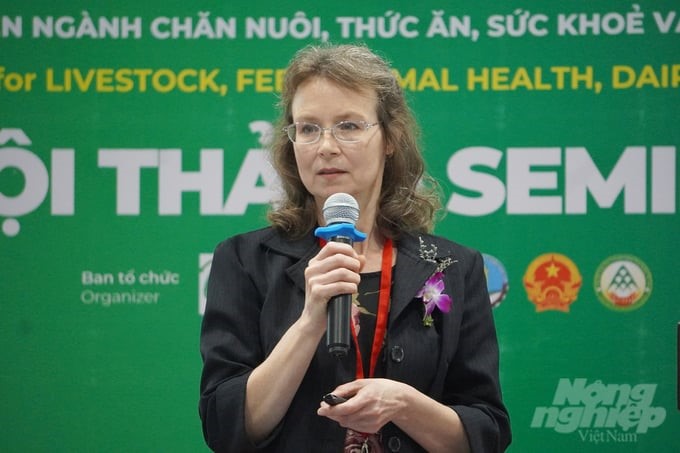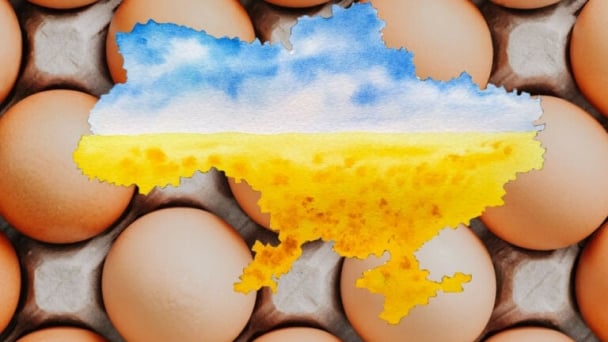May 21, 2025 | 07:36 GMT +7
May 21, 2025 | 07:36 GMT +7
Hotline: 0913.378.918
May 21, 2025 | 07:36 GMT +7
Hotline: 0913.378.918

The chicken farm of Ba Huan Joint Stock Company is raised according to the animal welfare model. Photo: Nguyen Thuy.
According to experts, animal welfare is simply understood as treating animals well so that they are in the best physical and mental state, avoiding unnecessary pain, whether they are animals raised for food, production tools, pets, or are captive wild animals.
At the workshop on "Animal welfare, sustainable livestock farming development, and export" recently organized by the Vietnam Farms and Agricultural Enterprises Association (VFAEA), many experts said that one of the important things that farmers need to pay attention to is the fact that some buyers, big brands, and retail chains in the world are now purchasing chicken eggs certified for animal welfare or are committed to gradually eliminating pork raised in cages and only buying pork raised from animal welfare farming models. When buying animal-derived food, consumers are also concerned about how animals live in the cage. This will be the trend in the future.
Dr. Ha Thuy Hanh, Vice President of VFAEA, said that in Vietnam, animal welfare is still a new concept, and not all farmers understand it. "Animal welfare is an extremely important factor in developing a sustainable livestock industry," she said.
Sharing about animal welfare in livestock farming according to international standards, Dr. Cu Thi Thien Thu, lecturer at the Hanoi Agricultural University 1, said that since 2018, Europe has had a clear message of "End the cage age for farm animals."
In order for products from cattle and poultry to be free of antibiotic residues and growth substances, instead of letting livestock (laying hens, sows) "liberate" in cages, it is necessary to create conditions for them to live in a free environment according to their behavior. "When livestock are not stressed, they will produce more productive and better-quality meat and eggs," said Dr. Cu Thi Thien Thu.

Dr. Ha Thuy Hanh, Vice President of VFAEA, shares about animal welfare. Photo: Nguyen Thuy.
Dr. Ha Thuy Hanh stated that, in Vietnam, chickens are often raised in cages with many floors. Meanwhile, egg-laying chickens are often raised in cages at high density, lacking nests, exercise, playgrounds, and perches, and not being allowed to express instinctive animal behavior. The whole country has a total chicken flock of about 550 million heads, but the proportion of chicken flocks ensuring animal welfare is still very small.
Similarly, industrial pregnant and nurse sows are raised in metal cages without exercise or conditions to express natural instincts such as rubbing their snouts, moving, standing, interacting, etc. As of December 31, 2023, the whole country had about 3.2 million sows raised to provide breeds for Vietnam's pork industry. Raising sows in cages is still common, and there are currently no pig farms certified for animal welfare.
According to Ms. Hanh, animal welfare was legalized in the US in 1976, Europe in 2007, Korea in 2014, and China in 1998. In Vietnam, it was legalized in the Law on Veterinary Medicine 2015 and the Law on Animal Husbandry 2018, which provide detailed regulations on issues related to animal welfare, from livestock farming to transportation and slaughter.
Ms. Le Thi Hang, Manager of the Farm Animal Welfare Program in Southeast Asia, Humane Society International (HSI) Organization, said that Vietnam currently has six chicken-farming businesses that have achieved Certified Humane (Cage Free Egg) certification from the Humane Farm Animal Care (HFAC) Organization, including Vinh Thanh Dat (Dong Nai), Ba Huan (Hanoi), Dabaco (Bac Ninh), Emivest (Binh Duong), Green Connect (Dong Nai), and CAS Farm (Ninh Thuan). Certified Humane is recognized by more than 70 animal welfare and humane treatment organizations globally.
According to Dr. Sara Shield, Scientific Director of the HSI Organization, farm animal welfare is not only a concern in high-income countries but in any country.
“Animal welfare in livestock farming is a very important factor. The World Organization for Animal Health (WOAH) in 2008 passed the Terrestrial Animal Health Code, stipulating that “sows and gilts, as well as other pig breeds, are social animals and prefer to live in herds. Therefore, they should be allowed to live in groups during the pregnancy period.
To keep up with the pace of scientific and technological developments, changes in global businesses, and legal policies and institutions, it is necessary to invest in cage-free farming for pregnant sows," said Dr. Sara Shield.

Dr. Sara Shield, Scientific Director of HSI. Photo: Nguyen Thuy.
"HSI is working with relevant parties, state agencies, customers, and farmers to promote this model," Dr. Sara Shield said and provided additional information that, compared to other countries in the region such as Malaysia, the Philippines, and Singapore, Vietnam is also one of the countries that are approaching and gradually moving towards animal welfare in livestock farming.
As an enterprise with more than 50 years in the poultry egg industry, Ba Huan Joint Stock Company has a large scale with three farms in Binh Duong, Long An, and Thanh Hoa; two egg processing factories (Ho Chi Minh City, Hanoi); one food processing factory (Long An); and one animal feed factory (Binh Duong). With this scale, Ba Huan can optimize all fresh raw material sources.
According to Mr. Doan Ngoc Duy, Director of Strategy Division at Ba Huan Joint Stock Company, with current consumers' tastes, the business produces product lines from chicken eggs that are sustainable and environmentally friendly. These products can be associated with humanity.
“Humane Certified certification is in line with the company's orientation, creating many new products, including products with herbivore standards. Thereby creating opportunities to open new markets as well as expand export opportunities for livestock products, raising the value of Vietnamese food brands in the international market," Mr. Duy said.
"In the coming time, we will continue to implement communication programs, develop training programs, and build livestock farming models ensuring animal welfare. We will also consult with farms and businesses to obtain animal welfare certifications.
In addition to biosafety farming and reducing the amount of antibiotics used according to the regulations of the Ministry of Agriculture and Rural Development, we also include animal welfare requirements. Among them, there are 5 criteria: no hunger or thirst; free from both physical and mental discomfort; free from pain, injury, or illness; free from fear and anxiety; freedom to express instinctive behavior.
As required by the Humane Farm Animal Care Organization, the criteria for animal welfare are mandatory. Therefore, farmers and businesses should have farms that ensure animal welfare to create good-quality products from healthy animals raised in a humane environment to serve domestic market needs and aim at export," said Dr. Ha Thuy Hanh, Vice President of VFAEA.
Translated by Huyen Vu Thu

(VAN) Oliyar, a prominent Ukrainian oil and fat manufacturer, has revealed plans to build a farm for 2.3 million laying hens in the Lviv region. The additional production quantities promise to change the competitive landscape of the egg market of the Eastern Europe region.

(VAN) On May 15, Ministry of Agriculture and Environment of Vietnam hosted the 'Connecting Vietnam - Germany agricultural, forestry and fishery trade' seminar in Berlin, Germany.

(VAN) In the face of counterfeit and imitation products, Khanh Hoa Salanganes Nest Company hopes for the prompt completion of the legal framework, strict enforcement against violations, and protection of the bird’s nest brand.

(VAN) Japan's efforts to lower the price of rice through the release of its stockpile may finally be making some progress, albeit at a snail's pace.

(VAN) U.S. tariffs are not only a 'shock', but also an opportunity for Vietnamese businesses to renew their mindset toward comprehensive development.

(VAN) As Bac Giang lychee enters the harvest season, Minister Do Duc Duy expects that the fruit will contribute greatly to agricultural exports due to standardized production and deep processing.

(VAN) Consumers have shown a preference for free-range eggs, but those farming systems are more vulnerable to biosecurity risks like bird flu.